|
|
|
Sort Order |
|
|
|
Items / Page
|
|
|
|
|
|
|
| Srl | Item |
| 1 |
ID:
174031
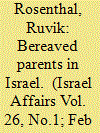

|
|
|
|
|
| Summary/Abstract |
This article explores the changing voice of bereaved parents in Israel from 1948 to the present. Until the early 1980s, bereaved parents did not express their grief or protest publicly. Their bereavement was a strictly private matter. In 1982, shortly after the outbreak of the First Lebanon War, their grief and protest burst into the public sphere. From then on, their voice gained momentum and legitimacy and in time directly impacted the political decision-makers. The article defines four phases in the changing content, tone and style of parental bereavement – hidden, political, privatized, and moral – by analyzing and comparing six representative texts.
|
|
|
|
|
|
|
|
|
|
|
|
|
|
|
|
| 2 |
ID:
170707
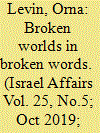

|
|
|
|
|
| Summary/Abstract |
This article addresses an unstudied literary discourse pattern in Israeli literature, which it terms an ‘empty discourse’ on Israeli wars, suggesting that they have become a simultaneously absent and present theme in Israeli literature. The analysis is based on Wittgenstein’s philosophy of language, which serves to explain the mutual influence between the reality of war and war literature. Based on the literary analysis presented, the article suggests a wider typology for examining this issue in contemporary Israeli literature published after the 2006 Lebanon War.
|
|
|
|
|
|
|
|
|
|
|
|
|
|
|
|
| 3 |
ID:
189659
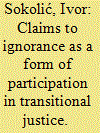

|
|
|
|
|
| Summary/Abstract |
Transitional justice is premised on participation that allows local publics to construct, critique and have some ownership over the process. The current scholarship assumes that individuals openly express their views of the process, or that they remain silent. The scholarship has neglected a third, significant form of participation: active withholding of views by saying ‘I don’t know’. This article examines such claims to ignorance and argues that they can provide insight into participation. While both qualitative and quantitative researchers of transitional justice have observed a pervasive pattern of high ‘don’t know’ responses, such claims to ignorance have not been studied. This article develops a theoretical framework that shows that ‘don’t know’ responses are a valuable source of information and argues that they are often an expression of a lack of willingness to respond, rather than genuine ignorance. Drawing on an original corpus of data collected through inter-ethnic focus groups and surveys conducted in four former Yugoslav countries, the study demonstrates how claims to ignorance are constructed as novel manifestations of resistance, restraint or disentitlement. These point to a rejection of transitional justice, which needs to be addressed if individuals are to feel like legitimate participants in the process.
|
|
|
|
|
|
|
|
|
|
|
|
|
|
|
|
| 4 |
ID:
111863
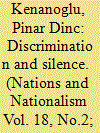

|
|
|
|
|
| Publication |
2012.
|
| Summary/Abstract |
In 1974, the dispute between Turkey and Greece over Cyprus resulted in Turkish military intervention in the island. The same year, the Turkish Court of Cassation issued a legal decision that rendered possible the confiscation of properties belonging to minority foundations in the years to come. I argue that the case of minority foundations in 1974 was not a coincidence but a conscious reciprocal discrimination applied in both official and unofficial spheres. I support my argument with the following indicators: (1) the wider historical Greek-Turkish conflict and its 'reciprocal' nature of discrimination against non-Muslim minorities; (2) the laden interpretation of the non-Muslim minorities as the internal enemies in the Turkish mind-set and its direct reflections on the 1974 case of foundations; and (3) the nature of the press coverage, which I assess using detailed reading and content analysis of three Turkish newspapers (Hürriyet, Tercüman, Cumhuriyet) and one Rum minority newspaper (Apoyevmatini).
|
|
|
|
|
|
|
|
|
|
|
|
|
|
|
|
| 5 |
ID:
190679
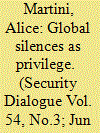

|
|
|
|
|
| Summary/Abstract |
Silences are not only absences in the spoken discourse or gaps in the discursive texture of international politics. They are important nodes of this texture and, as such, they constitute the political too. The said and the unsaid may work together to reify knowledge and shape international politics. Starting from this idea, this article scrutinizes global counter-terrorism as a discursive formation, composed of a spoken and an unspoken sphere. Within the silent dimension, the work focuses specifically on the silences in far-right terrorism and extremism. Scrutinizing global counter-terrorism as a racialized formation, the article argues that these silences are produced and reproduced by whiteness. Within the international community’s debates, whiteness gives rise to two kinds of silence – silence as the unspoken and the spoken as silencing. Examining them through the prism of whiteness, the article shows that these silences allow the maintenance of white privilege. This is the privilege of not being identified as a terrorist Other and not becoming the object of counter-terrorism measures, while having this privilege silenced and hidden. This work thus shows that, as gears of discursive formations, silences are racialized and may have colors – in this case, the color of white privilege.
|
|
|
|
|
|
|
|
|
|
|
|
|
|
|
|
| 6 |
ID:
162415
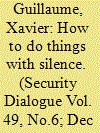

|
|
|
|
|
| Summary/Abstract |
This contribution offers the first steps in a novel conceptualization of how international relations and security studies can provide an analytics of silence. Starting with an analysis of a paradigmatic use of silence in the field, Lene Hansen’s ‘Little Mermaid’, the contribution shows the limitations and issues with an analytics that concentrates on the meaning behind silences. Silence as meaning is problematic because analytically what is offered solely is the overinvestment of the analyst’s ‘horizon of expectation’ upon a sign that is not generally meant to be one. Mobilizing a feminist reading of pornography as speech act, the contribution shows how silence may also be performative, in the sense that it does something to a specific logocentric order at the heart of our analysis of the international or security. The contribution finally offers a possible way of thinking about silence as doing rather than meaning and shows how this can be a possible analytical path to invert our analytics of the international and security from the perspective of the state/the powerful to that of the subaltern.
|
|
|
|
|
|
|
|
|
|
|
|
|
|
|
|
| 7 |
ID:
174032
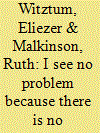

|
|
|
|
|
| Summary/Abstract |
This article discusses denial and silence pertaining to events from the Palestinian Intifada (1987–93) as confronted by medical and mental health professionals. It defines denial from a multidisciplinary perspective comprising psychoanalysis, cognitive psychology, sociology, and medicine, then analyzes personal recollections as well as texts from interviews with psychologists, social workers and psychiatrists. Using the concept of Professional Historical Error, the article shows that some professionals failed to recognise and accept the presence of the Intifada in denying potential mental distress and injuries among soldiers involved in military actions.
|
|
|
|
|
|
|
|
|
|
|
|
|
|
|
|
| 8 |
ID:
184088
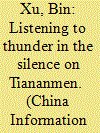

|
|
|
|
|
| Summary/Abstract |
‘Forgetting’ has been widely used in academic and public discourses of the memory of the 1989 Tiananmen Incident. The term, however, is conceptually unclear, empirically ineffective, and ethically problematic. Conceptually, it relies on a problematic assumption that silence means forgetting. Empirically, it lumps together different states of memory: ‘don’t remember, don’t talk about, don’t know, and don’t care.’ Ethically, it allows a broad, unjust moral accusation of those who remember but remain silent for various reasons. I argue that ‘silence’ provides greater conceptual precision, more analytical subtlety, and less ethical liability. Silence does not mean forgetting. Nor does it always mean the complete absence of sound. Rather, it refers to the absence of certain discourses about the past. I propose a perspective based on different forms of silence – ‘silencing, silenced, and silent’ – and illustrate it in an analysis of the memory of Tiananmen. Contrary to conventional wisdom, the analysis shows that the Chinese state initially intended to create a ‘covert silence’ – forcing people to remember rather than forget the official stories and silencing other narratives – and then an ‘overt silence’ in which all mention of the event was absent. Even underneath overt silence, however, are various experiences with ambiguities and nuances. The term silence also recognizes individuals’ ethical-political dilemmas under a repressive regime and aims to provide a language for an equal and inclusive truth-and-reconciliation process in the future.
|
|
|
|
|
|
|
|
|
|
|
|
|
|
|
|
| 9 |
ID:
192925
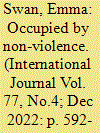

|
|
|
|
|
| Summary/Abstract |
Liberal peacebuilding has had its fair share of critiques. Along with highlighting its neo-liberal and Western-centric foundations, scholars have also drawn attention to its disregard for Indigenous peace frameworks. Peacebuilding in Palestine is no exception. Based on ethnographic research in the West Bank, this paper examines Orientalist narratives of Palestinian men embedded within the liberal peacebuilding framework and highlights the way that men engaged in unarmed resistance have navigated this terrain through the adoption of public transcripts which (re)narrate the Palestinian story/experience. I argue that this adoption can be interpreted as an act of critical agency where the silencing of their own beliefs is turned on its head to empower and further their agenda and goals. In this way, representation, knowledge, and silence can be understood as not only tools of colonial control, but also tools for Indigenous resistance to Western discourses, narratives, and representations.
|
|
|
|
|
|
|
|
|
|
|
|
|
|
|
|
| 10 |
ID:
188988
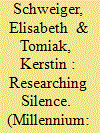

|
|
|
|
|
| Summary/Abstract |
The role of silence has received increasing attention in International Relations, ranging from silence as exclusion to secrecy and performance. Yet, there has been little effort to draw together a more practical, methodological inquiry into silence and how to engage with it in the research processes. This article builds on existing studies on silence and our own research experiences in conducting interviews and text analysis to interrogate the role silence plays in the research process. It aims to develop methodological tools for engaging with silence and offers a practical guide to analysing it from the data generation stage to the interpretation of silence. In doing so, it also contributes to attempts to redefine the meaning of silence in International Relations by including silence as more than an absence.
|
|
|
|
|
|
|
|
|
|
|
|
|
|
|
|
| 11 |
ID:
173397
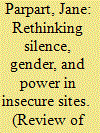

|
|
|
|
|
| Summary/Abstract |
My current interest in silence, gender, and power owes much to discussions with Marysia Zalewski over the years. Much of my work has focused on masculinity, gender relations, and gender hierarchies with a focus on security and development in conflict zones. More recently, I have begun to explore silence not as a sign of disempowerment, but as a powerful force that can be used in many ways. This approach enables a more multi-levelled understanding of silence and voice and their many interactions. It has much to tell the Global North, where we prize voice and often underestimate the power of silence.
|
|
|
|
|
|
|
|
|
|
|
|
|
|
|
|
| 12 |
ID:
192924
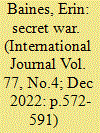

|
|
|
|
|
| Summary/Abstract |
Breaking the silence around wartime sexual violence is often understood as paramount to ending it. Many survivors feel compelled to publicly testify to prevent future harms, contest denial, and hold perpetrators to account. Yet, testimony is not always spoken, and silence should not be elided with powerlessness. In this article, we conceptualize the space in-between silence and voice as a form of multi-modal testimony that is given to protect, sustain, and reimagine relationships. We consider this in relation to the efforts of Adok, a woman abducted and forced into marriage by a rebel group in northern Uganda. Following her escape and return home with two children, Adok faced what is described as the “secret war”: ongoing structural and lateral violence. Her efforts to hold the father of her children to account attests to the “secret war,” and calls for a collective response to protect the future of her children.
|
|
|
|
|
|
|
|
|
|
|
|
|
|
|
|
| 13 |
ID:
184073
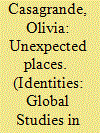

|
|
|
|
|
| Summary/Abstract |
This article explores the relationship between land, words and silence, and the ways they are articulated in biographical trajectories. In the context of displacement and successive home-making, it follows the spatial and temporal trajectories of a Mapuche family, their non-linear routes through the experience of exile, and the process of dwelling in the elsewhere. Exile is addressed here as a condition of being, a tension between presence and absence that involves loss, and that is negotiated through the interplay between words and silence, leading to the meaningful emergence of what I call ‘unexpected places’. At the core of this argument is a recognition of the intersubjective and hermeneutic borders that exist between persons in relation to speech and silence, in this case my partial understanding of the word ‘land’ (mapu), which disclosed the limits of language and the specificity of one’s lifeworld, and thus the boundaries of anthropological knowledge.
|
|
|
|
|
|
|
|
|
|
|
|
|
|
|
|
| 14 |
ID:
168570
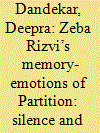

|
|
|
|
|
| Summary/Abstract |
This article analyses the Partition narrative of an Ashraf Muslim woman, who was seven years old at the time of Partition. Now resident in California, Zeba Rizvi was interviewed as part of the 1947 Partition Archive project, archived at the Stanford University Library. In this article, I interrogate relationships between memories and emotions of Partition, reconstituted through oral history that suggests the additional reframing of Partition-memory archives as an emotions archive. While Zeba’s interview reveals how emotional gaps are arbitrated by rapport, or absence thereof, I argue, using a phenomenological approach, that Partition memory-emotions conform to the narrator’s evolving and dynamic sense of self through time, that is also evident in the interview. Zeba Rizvi resists and reconstructs the politics of Partition in agential ways, using art to express secularism and its emotions: love-pyar, while re-inscribing and conforming to Ashraf values of gender, class and the celebration of heritage.
|
|
|
|
|
|
|
|
|
|
|
|
|
|
|
|
|
|
|
|
|